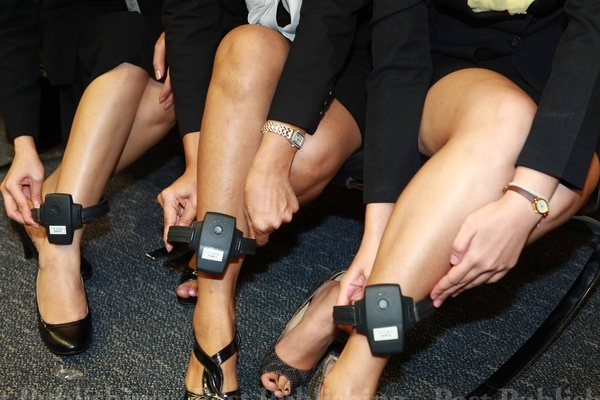The Probation Department will fit another 3,000 people convicted of minor offences with electronic-tracking ankle bracelets in 22 provinces across the country by the end of this year.

Officials from the Probation Department show off the electronic monitoring ankle bracelets which the authorities plan to use on illegal taxi drivers and unregistered tour guides at Suvarnabhumi airport. The device is intended to alert airport security when the offenders return to the airport. (Bangkok Post file photo)
Department chief Kannikar Saengthong said on Wednesday that the department recently spent 70 million baht purchasing 3000 more tracking bracelets to monitor offenders in less serious cases.
All these tracking devices are expected to be in use by the end of this year, Ms Kannikar said. The offenders will be tracked by GPS signals so their location can be monitored to ensure they do not breach their probation terms.
Earlier, 200 electronic tracking ankle bracelets were fitted to offenders convicted of "less serious" offences, mostly drunk driving.
The department had to purchase the new tracking devices as its lease of 200 tracking tags from a private firm expired, she said.
Use of the tracking devices will expand to cover 27 areas in 22 provinces across the country by the end of the year.
Ms Kannikar said said a total of 257 offenders have now been fitted with electronic tracking bracelets. These included 162 convicted drunk drivers. The remainder were convicted of physical assault and minor drug offences.
During the pilot project, the tracking devices were introduced in Bangkok, Nonthaburi, Samut Prakan and Samut Sakhon.
The project will be expanded this year to Ayutthaya, Lop Buri, Chachoengsao, Nakhon Pathom, Phetchaburi, Surat Thani, Phuket, Songkhla, Chon Buri, Udon Thani, Sakon Nakhon, Khon Kaen, Ubon Ratchathani, Nakhon Ratchasima, Chiang Mai, Chiang Rai, Phitsanulok and Nakhon Sawan.
Ms Kannikar on Wednesday signed an agreement with the Don Mueang Kwaeng Court to use the tracking devices on offenders that come before the court.
The department chief said the Don Mueang Kwaeng Court was the first court chosen by the department to introduce the system and reduce red tape and accelerate the judicial process.
In the future, the department will seek cooperation in using the technology from other courts and agencies such as police, public prosecutors and the Corrections Department to use information technology, she added.
Since April 1 this year, the Don Mueang Kwaeng Court has handled 1,115 cases, mostly drug offences, 898 cases. There were nine cases IN which the court ordered use of tracking bracelets for offenders, Ms Kannikar said.
Dusit Padungsak, chief of the Don Mueang Kwaeng Court, said the court was a model for use of information technology to replace paper work. The court also provides a one-stop service centre for people to contact it, he said.